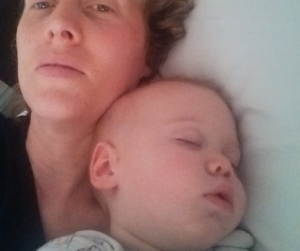While some people suffer from insomnia their whole lives, If you’re like many women, your sleep might have changed drastically since having kids.
If you’re a parent reading this, you know that when kids come along, sleep goes by the wayside. Usually sleep is disrupted for both parents, but moms (generally) take a big brunt of the sleep changes. And those sleep disruptions can last for many years. Some people have babies that sleep really well from the get-go, but if that’s not your child(ren), know that you are NOT alone. It’s completely normal for infants and young kids to not sleep through the night.
You know that phrase “sleep like a baby”? Yeah, I don’t want to sleep like a baby. I want to sleep like a teenager!
So, maybe you’re past those years where (most of) the sleepless nights are behind you. And you think: “YES! Now I can finally sleep through the night!”
But you go to bed, night after night, hoping to sleep well. And you don’t.
Maybe you go to bed at night, exhausted from running after kids and your daily workload, but you just can’t fall asleep.
Or maybe you wake up in the middle of the night and have a hard time falling back to sleep.
Or maybe you wake up very early, and can’t get back to sleep at all.
Why? What exactly is going on?
There are a few reasons why this might be your reality.

1. Age – if you had kids in your late teens/early 20’s, age might not be playing as much of a factor. But if you had kids in your 30’s or 40’s, age is very likely playing a role. As we age, we just don’t sleep as well. Our chronotypes shift (we tend to become earlier risers and tend to go to bed earlier). And our melatonin production drops with age. So if you started your early 30’s sleeping really well, then had kids, and are now leaving your 30’s not sleeping as well, age could be playing a factor.
That doesn’t mean there are no solutions for you! There are still lots of things you can do to make sure you sleep well, even as you age.
2. Hormones – This ties into age as well, to some degree. Immediately after kids, in the postpartum period, hormones are changing almost daily. It’s very normal to have hormone related sleep disruptions postpartum, but it’s not usually something you’ll notice since you’re up and down at night taking care of an infant. Most of the time our hormones “settle down” and go back to “normal” after having kids, but it’s not uncommon to feel like your hormones have changed after having kids and haven’t gone back to your pre-children “normal”. Sometimes this shows up in sleep, or sometimes it shows up in changes in your menstrual cycle, or skin.
Age and hormones are also intimately connected. Every woman is different, but perimenopause (the period of time before menopause) can last for up to 10 years before menopause. And you might start noticing symptoms of perimenopause in your mid-30’s. During perimenopause, estrogen and progesterone start declining, and in menopause they drop off quite significantly. Progesterone, in particular, plays a big role in maintaining sleep, which is why sleep disruption in perimenopause/menopause can be very common. So, it’s possible that the sleep disruptions you’re seeing after your kids have now settled into their own sleep patterns could be connected to hormones.
A disrupted thyroid hormone amount (either too much or too little) can also severely interfere with sleep. Hyperthyroidism (too much thyroid hormone) can cause heart palpitations, night sweats, and anxiety, which can make sleep problems worse. Hypothyroidism (too little thyroid hormone) has also been linked to worse sleep at night, though the mechanism as to how that works isn’t entirely clear. These thyroid conditions can exist pre-pregnancy, but they can also be triggered by pregnancy. If you also experience dry skin, dry hair, extreme fatigue, weight gain, and cold intolerance, you should talk to your doctor about being screened for hypothyroidism. If you experience any of the conditions I mentioned above (heart palpitations, night sweats, anxiety), you should talk to your doctor about being screened for hyperthyroidism.
3. Habits – The final big reason sleep changes between when you don’t have kids and when you do boils down to the same thing that drives a lot of what we do – our habits. We go from sleeping on a (partially) regular schedule to getting up and down all night, every night. When you have an infant, and then a toddler, you don’t necessarily have control over your sleep. And even though you’re exhausted, you might not be able to sleep. Because your sleep cues change, and your waking cues change, your body learns these changes. That’s the good and the bad thing about our habits – it doesn’t take long to learn the bad ones.
The good news is that good habits can be learned, to replace the “not-so-ideal” sleep habits that you might have learned over the past 2 to 10 years.
4. Stress – Don’t forget everyone’s favorite thing – stress! Do you feel your life is more stressful after having kids? If you’re like most people, you would answer yes to that question. It’s a well known fact that stress makes sleep worse, both falling asleep and staying asleep. Finding a good outlet to deal with that stress will definitely help you sleep better. Some of my other resources on stress (click here for a YouTube video and here for my blog post) might give you a few strategies on how to beat stress.
These are the most common reasons why sleep changes in mothers after having kids, but there are a lot of reasons why sleep can be disrupted in people.
- Reflux
- Sleep apnea
- Diabetes
- Restless legs
- Thyroid problems – both hyperthyroidism and hypothyroidism (discussed above!)
- Cosleeping – with kids and/or a partner
- Urinary issues – many people think they wake up at night because they have to pee, which might be true, but sometimes you wake up at night AND you have to pee. It wasn’t having to pee that woke you up.
- Side effect of medications
So, this isn’t all bad news though, is it? Definitely not! Even if your sleep hasn’t been the same since before having kids, there are still a lot of things you can do about it. Send me an email, or follow me on social media for tools to help create healthy habits that will improve your sleep.
